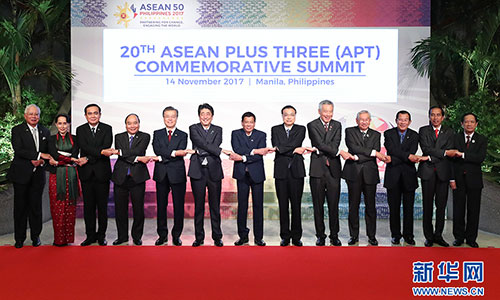Asian leaders to meet on COVID-19
By GT staff reporters Source:Global Times Published: 2020/4/14 0:33:41
China, ASEAN, Japan, South Korea to ‘stabilize regional industrial chain’

20th ASEAN plus three (APT) commemorative summit in 2017. Photo: Xinhua
A special video conference on handling the COVID-19 pandemic will be held on Tuesday among top officials from China, South Korea, Japan and the Association of Southeast Asian Nations (ASEAN), and this first-ever high-level regional meeting on fighting the pandemic after the outbreak may boost regional efforts in joint prevention and control as well as stabilize the regional industrial chain, experts said.
China and South Korea are the two countries that have contained the virus most efficiently on the continent and been acknowledged worldwide, and how they will jointly offer a solution to the region and the world in the pandemic battle could draw attention worldwide, experts noted.
Chinese Premier Li Keqiang will attend the video conference, which will be hosted by Vietnam, the ASEAN chair in 2020. China expects exchanges of views within the ASEAN Plus Three (APT, ASEAN plus China, Japan and South Korea) to control the spread of COVID-19 while maintaining economic development, Chinese Foreign Ministry spokesperson Zhao Lijian said at Monday's press conference.
Zhao added China also expects to promote results in strengthening pandemic prevention and control, improve the level of healthcare collaboration in East Asia, advocate trade exchanges and promote regional economic integration during the meeting.
Following the extraordinary virtual summit of G20 leaders on fighting the COVID-19 pandemic in late March, Tuesday's conference embodies the determination and willingness of East Asian countries to join hands in fighting COVID-19 as well as maintaining regional economic development, Zhao said.
Countries are mostly battling COVID-19 on their own since the outbreak, observers noted. Yet the common crisis is in need of joint efforts, to which experts believe Tuesday's video conference will likely provide suggestions and even institutional cooperation among regional countries.
The APT mechanism used to focus on economic issues, including the establishment of a free trade zone in the region, and the upcoming meeting will see the expansion of its focal point to non-traditional security sectors, Lü Yaodong, director of the Chinese Academy of Social Sciences' Institute of Japanese Studies, told the Global Times on Monday.
China has accumulated some efficient experiences in containing the virus, Lü said, adding it will share its measures and lessons from its fight against the epidemic to regional countries.
China has also been increasing its medical assistance to ASEAN, and relevant topics over the aid on non-traditional security sector will likely be on the agenda of the meeting, analysts said.
A special foundation may be set up for that, said Su Hao, founding director of the Center for Strategic and Peace Studies at the China Foreign Affairs University. Regional leaders might discuss how to promote the role of the Asian Development Bank and the Asian Infrastructure Investment Bank to facilitate cooperation among regional countries in fighting the pandemic.
Observers noted a pilot site may be considered on joint pandemic prevention and control through enhancing coordinated efforts in customs and immigration policies.
"It is time to set up an APT healthcare and medical mechanism, and share relevant information and resources in the region to fight not only the pandemic, but also possible future crises like this," Su told Global Times on Monday.
APT countries have held eight health ministers meetings as of September 2019. Experts from China and ASEAN have had multiple video conferences over COVID-19 since the outbreak. There are also forums between China, South Korea and Japan over infectious diseases.
The region doesn't have an institutional mechanism for handling the pandemic, Su said, noting the pandemic may be an opportunity.
The APT, as a mechanism which has been promoting regional economic integration since its foundation, will also discuss how to fix the supply chain which has been battered by COVID-19, observers noted.
It is believed participants of the meeting will discuss how to adjust the countries' policies to maintain material flows, trade connections and the supply chain in the region to stabilize the regional economy, Lü said.
The East Asian economy is the wind vane of the economy of not only Asia, but also the world, Ni Yueju, a senior research fellow at the Institute of World Economics and Politics of the Chinese Academy of Social Sciences, told Global Times. If the economy in the region is hit hard by the virus, it will also be a blow to the global economy, he said.
"Take Hubei, a crucial auto production base in China. The epidemic has hit its automobile industry after the city suspended its economic activities," Ni noted, adding it's also the case in other industries in the region.
But experts also noted the industrial chain cycle between China, South Korea and Japan is relatively complete, and if the East Asian countries can avoid disruption caused by the pandemic in their industrial chain, the region and Asia will recover from the crisis more quickly.